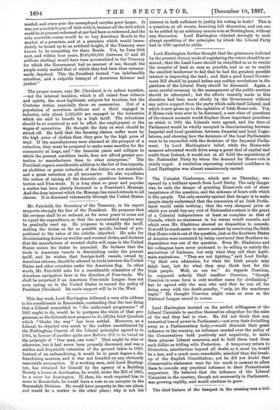The proper course, says Mr. Cleveland, is to reduce taxation,
—not the internal taxation, which is all raised from tobacco and spirits, the most legitimate subjects for taxation, but the Customs duties, especially those on necessaries. Oat of a population of seventeen millions and a third engaged in industry, only about 4623,000 are engaged in the industries which are said to benefit by a high tariff. The reductions should be so contrived as not to affect the employment or the wages of operatives. He thought the duty on wool should be struck off. He held that the farming classes suffer more by the high price of clothes than they gain by the high price of wool. If the manufacturers were alarmed at the prospect of a reduction, they must be prepared to make some sacrifice for the community at large, and "the financial panic and collapse to which the present condition tends, does not afford greater pro- tection to manufactures than to other enterprises." The President urges a considerable addition to the list of free imports, an abolition or great reduction of the duties on raw materials, and a great reduction on all necessaries. He also repudiates the notion of raising all the theoretic questions between Pro- tection and Free-trade. It is long since so great and popular a matter has been plainly discussed in a President's Message. And the deep interest which the Message has raised extends to all classes. It is discussed vehemently through the United States.






















































 Previous page
Previous page